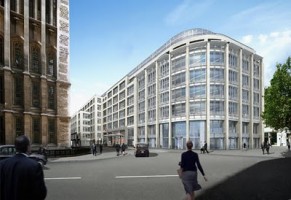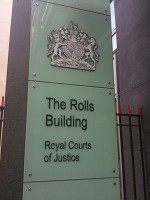The Rolls Building — now open for business
Roll up, roll up! Company, commercial, technology and construction. They’ve got ’em all in London’s brand new court complex, which last week opened its doors for, er, business. Located in Fetter Lane, in the heart of legal London, the Rolls Building brings together in one place all the courts of the Chancery Division of the… Continue reading
Roll up, roll up! Company, commercial, technology and construction. They’ve got ’em all in London’s brand new court complex, which last week opened its doors for, er, business.
 Located in Fetter Lane, in the heart of legal London, the Rolls Building brings together in one place all the courts of the Chancery Division of the High Court (including those dealing with companies, trusts and intellectual property) with those of the Admiralty, Commercial and Technology & Construction subdivisions of the Queen’s Bench Division. In other words, all the courts that deal in one form or another with businesses and their advisers. As such, it marks the fulfillment of a project which has been in the offing for some years now — for at least as long as we’ve been publishing the Business Law Reports. Speaking as the editor of that series, and on behalf of all its reporters, I can only marvel at the convenience of finding in one place all the first instance decisions which we are likely to want to report — as well as some of the appeals, since the Chancellor, Sir Andrew Morritt, will also be holding Court of Appeal sittings in the building.
Located in Fetter Lane, in the heart of legal London, the Rolls Building brings together in one place all the courts of the Chancery Division of the High Court (including those dealing with companies, trusts and intellectual property) with those of the Admiralty, Commercial and Technology & Construction subdivisions of the Queen’s Bench Division. In other words, all the courts that deal in one form or another with businesses and their advisers. As such, it marks the fulfillment of a project which has been in the offing for some years now — for at least as long as we’ve been publishing the Business Law Reports. Speaking as the editor of that series, and on behalf of all its reporters, I can only marvel at the convenience of finding in one place all the first instance decisions which we are likely to want to report — as well as some of the appeals, since the Chancellor, Sir Andrew Morritt, will also be holding Court of Appeal sittings in the building.
This is a modern high-tech court complex, designed to meet the needs of lawyers and litigants of the future. It even looks like an office building, with a light and airy atrium in place of the somewhat gloomy atmosphere of the main Royal Courts of Justice building (whose Victorian gothic style sometimes feels like a cross between Ghormenghast and Disneyland). The Rolls Building has clean, simple lines, lots of clear glass and, hopefully, a similarly transparent approach to the administration of justice.
Nor, we are pleased to note, have the needs of the law reporters working for ICLR been overlooked. Each court includes a space for the official law reporter, enabling him or her to attend hearings and record, where appropriate, the legal submissions which will be summarised if and when a case is reported in The Law Reports. The value of this is all the greater when one notices how efficiently the space in these compact modern courts has been managed.
 There is a larger court permanently available for company law applications, and three “super courts” designed for larger disputes involving more lawyers, more money and, inevitably, more press interest. Last week one of them, Court 26, was busy with a trial hearing before Mrs Justice Gloster in the long-running Abramovich v Berezovksy litigation, which has excited a lot of press comment, either because of the celebrity of the Russian oligarchs going head to head, or perhaps because it may be the last chance to see Jonathan Sumption QC in action as a barrister before he finally takes up his post as a Justice of the Supreme Court. Sumption, who is also a brilliant historian specialising in the Hundred Years War (no ironic comparisons with this case, please) is appearing for the defendant, Roman Abramovich. To cope with the additional press presence, two consultation rooms in the building had been given over to “Livenote”, a simultaneous relay consisting of a large screen displaying a line by line transcript of proceedings together with a live audio link, to enable journalists to follow the unfolding drama even if they couldn’t get into the court itself.
There is a larger court permanently available for company law applications, and three “super courts” designed for larger disputes involving more lawyers, more money and, inevitably, more press interest. Last week one of them, Court 26, was busy with a trial hearing before Mrs Justice Gloster in the long-running Abramovich v Berezovksy litigation, which has excited a lot of press comment, either because of the celebrity of the Russian oligarchs going head to head, or perhaps because it may be the last chance to see Jonathan Sumption QC in action as a barrister before he finally takes up his post as a Justice of the Supreme Court. Sumption, who is also a brilliant historian specialising in the Hundred Years War (no ironic comparisons with this case, please) is appearing for the defendant, Roman Abramovich. To cope with the additional press presence, two consultation rooms in the building had been given over to “Livenote”, a simultaneous relay consisting of a large screen displaying a line by line transcript of proceedings together with a live audio link, to enable journalists to follow the unfolding drama even if they couldn’t get into the court itself.
London is already a major international centre for marine and commercial arbitration, and the Rolls Building is part of a new strategy by the Justice Secretary, Kenneth Clarke, to make the City of London attractive not just as a financial centre but also as a centre for litigation. In a speech given last month at the CityUK Future Litigation event hosted by solicitors’ firm Clifford Chance, he rather sportingly declared: “I am almost as much of an enthusiast for English law as I am for English cricket.” But, he added, while the UK’s system of civil and criminal justice had many strengths, it was also “somewhat old-fashioned and bureaucratic, and doesn’t always work well for the public, or for business.”
Naturally enough, much of the attention has centred on the Alternative Business Structures, brought it by the Legal Services Act 2007 which will enable lawyers to form partnerships with non-legal professionals and accept outside investment, something the President of the Law Society, John Wotton, has said will “provide a means for widening access to legal services” (Solicitors Journal, 9 August 2011). It will enable companies like the Co-operative Group, already involved in banking and insurance, to offer certain kinds of legal services in competition with high street firms; but it will also enable big city firms to expand their operations and extend their reach into new markets, as the Justice Secretary hopes:
The rule of law is one of our greatest exports. This reflects, in part, our national genius for legal services, which generated nearly 2% of UK GDP in 2009 — a rather healthy £23bn… Our competitive advantage reflects many things: our open market, the unrivalled quality of the UK legal profession, our record of judicial independence and the plain good sense of English common law, amongst others. People turn to us because they understand that a decision from a UK court carries a global guarantee of impartiality, integrity and enforceability. Despite a very strong record, I believe we could do still more, particularly in the face of increasing competition — be it Singapore or Stockholm, Dubai or Hong Kong.”
Interesting that he should have mentioned Dubai, since this is where the International Bar Association will be holding its annual conference later this month (look out for the ICLR’s stand: we’ll be there to promote our new online service, officially launched next week).
Interesting, too, that he should have mentioned Singapore. Bearing in minds its attractions as an international centre for litigation, I had been hoping, somewhat facetiously, and no doubt most unfairly, to describe the Rolls Building as a sort of “forum shopping mall”. But then I googled the expression and found that there really is a shopping mall called The Forum — which is in Singapore.